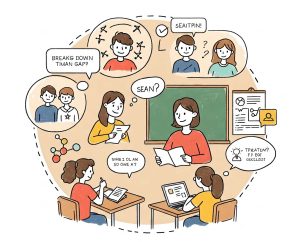Language teachers have a distinct skill set that can be applied to various professions. They might think their options are limited when leaving a profession that is in a turmoil nowadays, yet this is definitely not so. From communication and interpersonal skills to cultural competence and emotional intelligence, these adaptable educators are valuable assets to any organisation. Discover how this rich and diverse expertise in time management, problem-solving, and leadership can be utilised in our latest article.
Language teachers possess a unique set of skills that can be transferred to many different roles. They have communication skills, which enable them to express ideas clearly and concisely, listen actively, and communicate persuasively. Another set of strengths to highlight is interpersonal skills, which enable them to develop positive relationships with students, colleagues, and parents, resolve conflicts, and work collaboratively. Also, we cannot leave out cultural competence skills, which enable them to understand and respect cultural differences and appreciate diverse cultural norms and practices.
Language teachers are adaptable, as they can adjust to new teaching environments, teaching methods, and technologies. Although it may seem there is a sort of routine to their work, there is a large percentage of creative and innovative work involved in planning and designing learner-friendly materials. Time management needs to be highly effective as prioritising tasks and meeting deadlines is a daily requirement. Problem solving and on-the-spot decision-making are also benefits of having worked in a teaching job. Over time, skills like motivating students, collaborating with staff members, creating a positive learning environment and mentoring other teachers can be turned into great leadership values.
Emotional intelligence and soft skills are a much sought after skillset stemming from adjustment of teaching styles and methods to order to meet the diverse needs of students and catering for different learning situations. Language teachers can establish and maintain a safe, orderly, and respectful learning environment. The ability to understand and empathise with students’ needs, feelings, and perspectives means teachers also need to manage their own emotions and respond appropriately to students’ emotions.
Usage of the latest technology effectively to support teaching and learning and the ability to conduct research, collect and analyse data, and use evidence-based practices to improve teaching and learning mean teachers are fully capable of working in a wide range of industries where these skills are essential. And on this same note, they can design and implement formative and summative assessments to measure student learning and provide feedback, deliver effective presentations and make informed decisions based on available data and research. Multi-tasking is often their middle name…and remain up to date by engaging in professional development to improve and stay current with research and trends.
Employing a teacher transitioning out of teaching in another sector can be beneficial due to their transferable skills, diverse experiences, passion and dedication, professionalism, flexibility and adaptability, and transferable knowledge, with which they can bring new perspectives and approaches to the workplace. All the above lead to a strong work ethic and commitment to success in other fields, making them valuable assets to any organization.
At ILCA, we are convinced that these transferable skills can be elevated by adding coaching skills and will help teachers entering other fields to create a balanced portfolio in a successful career, wherever that might be.
Source: https://www.linkedin.com/pulse/beyond-teaching-grammar-vocab-why-we





